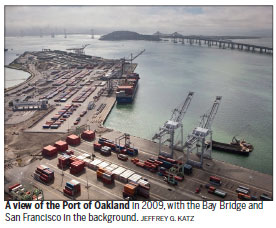If the Port of Oakland is any indication, US-China trade is robust
(China Daily USA) Updated: 2016-12-15 12:01While there's been some uncertainty these days about the future of US-China trade, things seem to be humming along - at least when measured by business at the Port of Oakland in Northern California.
Strong Asian demand - particularly from China - for California farm products, wine and other beverages helped produce an 11.5 percent increase in containerized export volume in November over the previous year.
"China continues to be a key trading partner for the Port of Oakland and its shippers," the port's communications director, Michael Zampa, told China Daily USA. "China is Oakland's No. 1 market for exports. It's also No. 1 in import volume shipped through Oakland.
"Oakland finds strong export markets throughout Asia - especially for agricultural products," he said. "This is a result of Asian economic expansion that has increased demand for US farm goods."
The port reported shipping the equivalent of 85,915 20-foot export containers in November, its second-highest total this year.
Also, through November, Oakland export volume was up 10.3 percent year-on-year. Containerized imports were 4.5 percent higher. Total loaded-container volume increased 7.4 percent.
The export surge happened despite a strong dollar that makes American products more expensive.
"If you listen to conventional wisdom, exports should be facing headwinds," port Maritime Director John Driscoll said in a news release. "But the clamor overseas for high-quality American commodities hasn't peaked, so our volumes keep climbing."
It was the third straight month of double-digit growth and the 10th time exports have risen this year, the port said.
There also was a good balance of trade. Port officials said exports have accounted for 52 percent of loaded cargo volume in 2016.
That nearly 50-50 split in cargo mix is unique, the port said. Other major US ports are heavily skewed toward imports, as evidenced by the US' $36.4 billion trade deficit.
The port attributed its export growth to its proximity to California's major growing regions in the Central, Napa and Salinas valleys, and to its role as the launch point for ships returning to Asia.
Commenting on a 10 percent increase in exports in October, a port official provided some insights on what was driving it.
"We're seeing a favorable confluence of events," said Beth Frisher, the port's manager of business development and international marketing. "Demand for high-quality US agricultural commodities is growing, and producers here have been able to respond thanks to good harvests and higher yields."
Agricultural exports have increased 16 percent in the past year, the port said. Farm products account for 40 percent of Oakland's 2016 total exports (through October), 38 percent more than last year.
The port said a 30 percent rise in shipments of edible fruits and nuts provided a good part of the increase.
Oakland, across the bay from San Francisco, exported the equivalent of 65,600 20-foot containers of those products through September, up from 50,306 containers. Grain and seed shipments increased 35 percent in that period, and meat exports rose 15 percent, the port said.
The port attributed much of its export growth to Asia's rising middle class. It said that consumers with new purchasing power desire high-quality American farm products.
The port said its top five export destinations are the Chinese mainland, Japan, South Korea, Hong Kong and Taiwan. The top five export commodities are wood pulp, fruits and nuts, beverages and spirits, meats and cereals.
In 2015, China accounted for 32.4 percent of total tonnage; Japan 12.5 percent and South Korea 12.3 percent.
"California agricultural exports have exceeded expectations so far in 2016, and in no small part due to Oakland's performance," Walter Kemmsies, managing director, economist and chief strategist for the US Ports, Airports and Global Infrastructure Group at JLL, a commercial real estate and investment management firm, said in November. "While US agricultural exports have declined in 2016, Oakland has registered an increase."
Kemmsies said exports are stronger than expected due to tighter inventories in Asia and higher output in the US. When the dollar is strong, transportation efficiency is vital for export competitiveness, he said.
The 2017 export outlook also looks bright because of improving economic conditions around the world.
"Regardless of other factors, Oakland looks poised to outperform again," he said.
Contact the writer at williamhennelly@chinadailyusa.com

- 'Cooperation is complementary'
- Worldwide manhunt nets 50th fugitive
- China-Japan meet seeks cooperation
- Agency ensuring natural gas supply
- Global manhunt sees China catch its 50th fugitive
- Call for 'Red Boat Spirit' a noble goal, official says
- China 'open to world' of foreign talent
- Free trade studies agreed on as Li meets with Canadian PM Trudeau
- Emojis on austerity rules from top anti-graft authority go viral
- Xi: All aboard internet express











